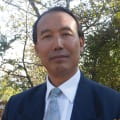North-east India
In the early 1990s there were violent clashes between two ethnic groups in north-east India. The Nagas and the Thadou-speaking Kukis were the main groups involved. There had been tension between the groups for generations and competition over ownership and use of land. But during this fresh eruption of conflict, the violence reached levels which had not been seen before and spread throughout the state.
Bann Makan takes up the story…
A beautiful 150 acres of rolling hills was home to us, 30 km away from Imphal. We had established a Pastoral Training Centre and a primary school for the Naga, Kuki and Meitei children from surrounding villages. The tension between the Kukis and Nagas had just begun, breaking into a civil war. Caught amid the clash we were forced out of the land. The Centre was attacked one Sunday morning. When we reached it, we found that 14 out of the 15 houses had been fully gutted by fire. But God had prepared us to face the reality of the massive loss by giving us a sign as we approached the village on that bright sunny day. Splashed across the horizon was the most beautiful rainbow, not just one but three layers of rainbow even though there was no rain to be seen! We were reminded of God’s promise to Noah in Genesis 9:12-13. Another assurance of his promise we found in two books, half burnt in the ruins, both open at the passage in Philippians 4:19, ‘And my God will meet all your needs…’
We are Nagas ministering among multi-ethnic communities as care-givers to drug addicts, people living with HIV, the poor and marginalised, planting churches and training leaders. Even though we are not from the main ethnic group, for us Imphal is home. When tensions rose, many Naga people left; we stayed on. But eventually, friends advised us to go to a safer place, and we left for three months. When we returned, there were still political tensions. Identity is a sensitive issue here.
Ministering in a violent place
We faced challenges and threats – constant riots, civil protests (bandhs), shoot-outs and bomb blasts. Searching for safe hideouts when bullets were flying in front of our house, and getting threatening calls, were both part of our lives as we continued the ministry. God’s call on our lives grew stronger, and amid growing tension we still managed to open a clinic where many lives were transformed in the heart of the most volatile area. The small church we planted then has branched into eight churches today. We dared and God, who ordained us ‘for such a time as this’, shielded us and worked through us. He blessed our weak human efforts, causing us to bear fruit that lasts (John 15:16).
I was a Peace Committee member, meeting with different ethnic groups, politicians, police, and government representatives to bring peace and reconciliation. Returning home late one night, I was chased by another vehicle despite the paramilitary highway patrol. Even our five-year-old son sensed the danger we faced and asked his mother if I would be killed by the opposing group. This hurt me so much that I took new steps to ensure my safety and security.
Compassion does not take sides
In conflict situations either you compromise and favour one side or you stay neutral and build relationships. We chose to remain neutral, asking for God’s blessings to work through us.
Conflict robs people of their perspective. Communities in conflict situations are usually there because they have lost their perspective, allowing interest groups to dominate their core. It is said that ‘we can choose our friends but we cannot choose our neighbours’. We have a situation in Manipur state where neighbouring ethnic groups are not on good terms. As Christians we must stand above the situation and build bridges for communal harmony.
Building bridges
God puts some in hostile and dangerous situations with the assurance of his continuous presence and protection. At times we had no message to give the people to comfort and bless them. The most difficult times for me were conducting funerals of conflict victims, including that of a young police officer who was killed by the opposing group.
In our position as care-givers, we often encountered conflicting interests. I once had the privilege of helping a young man from the community who destroyed our training centre. Caught in the fight between our two communities, he could not take his sister who was ill to Imphal for treatment. So he came to me in my church office seeking help. He would describe his sister’s symptoms and I would ask my friends, who were doctors, to prescribe the right treatment. We would also give him clothing, rice and some money. Six months later, she recovered and as a token of thanks he brought me an egg laid by their own chicken.
Not long after the communal riots I was invited to speak at the pastors’ conference of the community who destroyed our training centre. It was a serious choice to decide to go and I wondered if it would be a good move. They vouched their lives for my security. I went. It was a good decision: I was accepted and it was a sign of forgiveness. Forgiveness is a choice. The greatest joy for us is that we forgive those who wound us, and we are amazingly blessed.
Rev. Dr. Bann Makan is an ordained Baptist minister and is the Executive Director of El Shaddai Resource Centre (ESRC). He is a graduate of Fuller Theological Seminary in California. He has worked at a national and international level on leadership development and ministries of compassion. He has pastored Centre Church Imphal for seven years, has planted several churches and is presently involved in Bible translation, peace efforts and mobilising churches for Integral Mission. Bann and his wife serve together and are blessed with three children.
Adapted from an article published by the Christian Medical Journal of India (Volume 27, Number 4) with kind permission.









